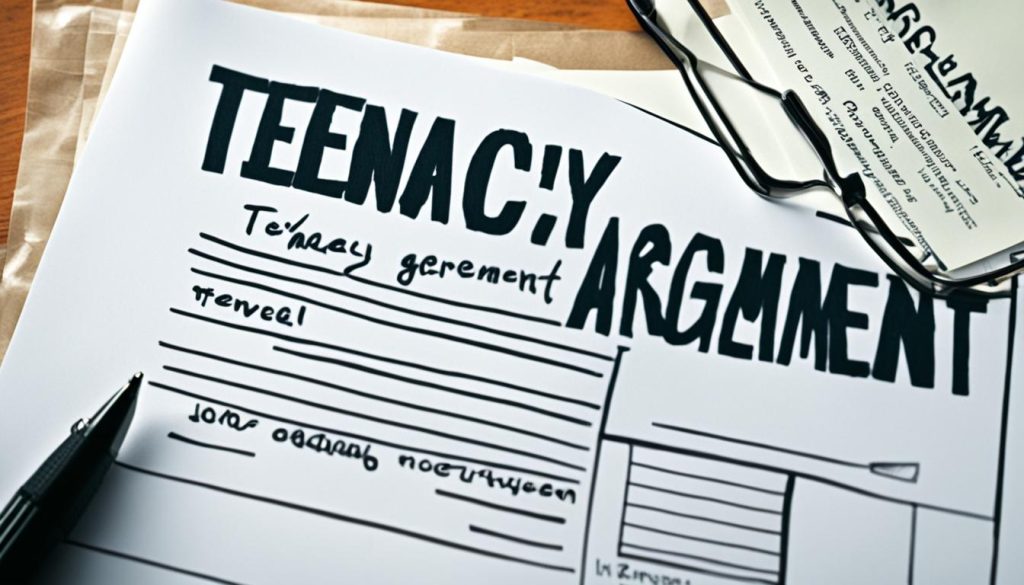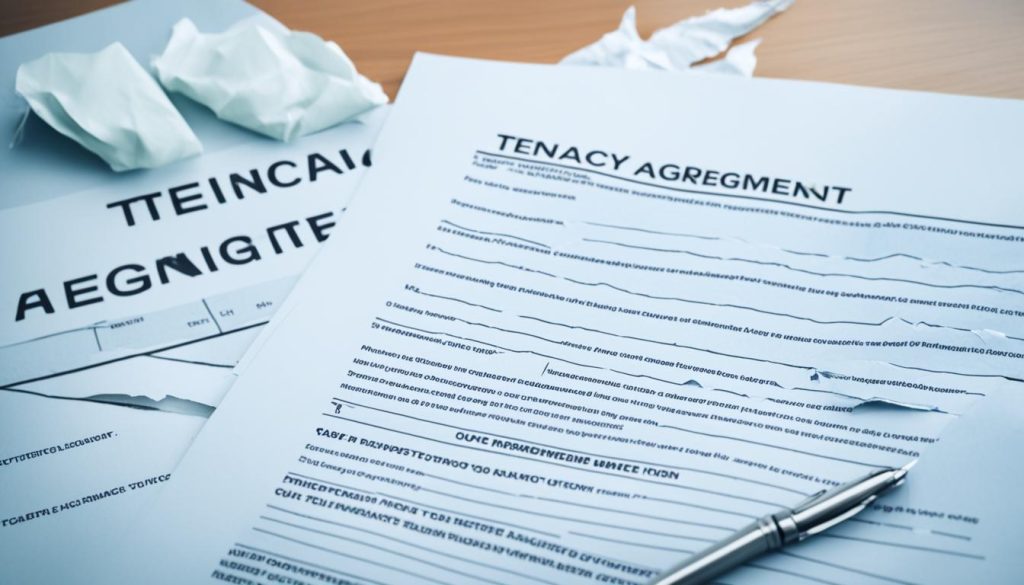Signing a tenancy agreement can be an exciting yet daunting step for many individuals looking to rent a property. However, what happens if you’ve signed the agreement but now find yourself wanting to cancel? This article explores the legal situation surrounding cancelling a tenancy agreement, the binding nature of these contracts, and the options available to both landlords and tenants in such scenarios.
The tenancy agreement cancellation, breaking a tenancy contract, early termination of tenancy, ending a rental lease, voiding a tenancy agreement, and tenancy agreement breach are all topics that will be addressed in this comprehensive guide. Whether you’ve had a change in circumstances or simply had a change of heart, understanding your rights and obligations is crucial.
Tenancy agreements are legally binding contracts, and once signed, both the landlord and tenant are expected to fulfil their respective responsibilities. This means that the tenant is generally responsible for the rent and other obligations from the start date of the tenancy, even if they decide not to move in. Navigating the i’ve signed a tenancy agreement but want cancel situation can be complex, but this article aims to provide you with the necessary information to make an informed decision.
Understanding Tenancy Agreements and Cancellation
A tenancy agreement is a legally binding contract between a landlord and a tenant that outlines the tenant rights, landlord obligations, and the terms and conditions of the rental arrangement. This formal document is essential in establishing a harmonious rental laws relationship between the two parties.
What is a Tenancy Agreement?
A tenancy agreement is a legally enforceable contract that defines the rights and responsibilities of both the landlord and the tenant. It covers crucial aspects such as the security deposit refund, the rental period, the monthly rent, and any other specific terms and conditions agreed upon by the two parties.
Binding Nature of Tenancy Agreements
Once a tenancy agreement is signed, it becomes legally binding on both the landlord and the tenant. This means that both parties are obligated to fulfil their respective responsibilities as outlined in the contract, regardless of any changes in their circumstances or plans.
Lack of Cooling-Off Period for Tenancies
Unlike some other types of contracts, there is generally no cooling-off period for tenancy agreements in the UK. This means that once the agreement is signed, the tenant is responsible for the rent and other obligations from the start date of the tenancy, even if they decide not to can you cancel a tenancy agreement within 14 days or can you cancel a tenancy agreement within 14 days uk.

I’ve signed a tenancy agreement but want cancel
Tenants may have various reasons for wanting to cancel a tenancy agreement after signing it, such as a change in their financial situation or a shift in their personal plans. However, once the agreement is legally binding, the tenant is obligated to fulfil the terms, and cancelling can have serious consequences.
Reasons for Wanting to Cancel
Unforeseen circumstances, such as a job loss, a family emergency, or a change in personal circumstances, can lead tenants to reconsider their commitment to a tenancy agreement. In some cases, tenants may have simply changed their mind after signing the contract, realising the property or location is no longer suitable for their needs.
Consequences of Cancelling After Signing
If a tenant decides to cancel a tenancy agreement after signing, they may be held liable for the rent for the entire tenancy period, as well as any other costs or fees incurred by the landlord due to the cancellation. This can include advertising the property, lost rental income, and administrative expenses. Landlords are not obligated to release tenants from their contractual obligations simply because they have changed their mind after signing the tenancy agreement.

Landlord’s Options for Dealing with Cancellation Requests
When a tenant requests to cancel a tenancy agreement after signing it, the landlord has several options to consider. The landlord’s obligations on cancellation and the legal grounds for tenancy termination are crucial factors in determining the best course of action.
Insisting on Compliance with the Agreement
One option for the landlord is to insist that the tenant complies with the terms of the rental contract and fulfils their obligations, such as paying the rent for the entire tenancy period. This approach upholds the binding nature of the tenancy agreement and may be particularly relevant if the landlord has already taken steps to prepare the property for the tenancy.
Considering a Deed of Surrender
Alternatively, the landlord and tenant can negotiate a Deed of Surrender, which is a legally binding document that terminates the tenancy agreement. This approach may be more suitable if both parties are willing to come to a mutually agreeable solution, particularly in cases where there is an early termination clause or a break clause in the rental contract.
Holding Deposit and Recouping Losses
The landlord may also be able to recoup any losses, such as the holding deposit or costs incurred in preparing the property for the tenancy. This could be especially relevant if the tenant’s request to cancel the agreement is not based on legal grounds for tenancy termination, as the landlord may be entitled to retain the holding deposit or seek compensation for other expenses.

Tenant’s Rights and Legal Grounds for Cancellation
While tenancy agreements are generally binding contracts, there are some legal grounds under which a tenant may be able to cancel the agreement. One key factor is whether the landlord or their agent provided misleading or incorrect information about the tenancy or the property. If this is the case, the tenant may have the right to “unwind” the agreement within 90 days of the tenancy start date.
Furthermore, if the landlord or agent failed to disclose important information that would have affected the tenant’s decision to sign the agreement, this could be considered an unfair trading practice and grounds for cancellation. Tenants have the right to cancel the agreement if they can demonstrate that the landlord or agent’s actions amounted to an unfair or deceptive practice.

It’s important to note that the right to unwind the agreement is not absolute and will depend on the specific circumstances of the case. Tenants must be able to show that the landlord or agent’s actions were misleading or deceptive, and that this had a material impact on their decision to sign the tenancy agreement.
If a tenant believes they have grounds to cancel the agreement, they should seek legal advice to understand their options and the process for doing so. By exercising their rights to cancel in cases of misleading or incorrect information, tenants can protect themselves from being bound to a contract that does not align with their expectations or needs.
Negotiating a Mutually Agreeable Solution
In the event of a tenant wanting to maintain a good relationship and avoid legal action, the best approach is often to negotiate a mutually agreeable solution with the landlord. This may involve the landlord and tenant working together to seek replacement tenants, or the landlord considering a Deed of Surrender to terminate the agreement. Preserving the landlord-tenant relationship and reducing the time and cost associated with resolving the issue through the courts can be beneficial for both parties.
Maintaining a Good Relationship
When a tenant wishes to cancel a tenancy agreement, maintaining a good relationship with the landlord can be crucial. By communicating openly and working collaboratively, the tenant and landlord may be able to find a solution that works for both parties, such as negotiating a mutual termination or a smooth transition to a new tenant. This approach can help to preserve the positive rapport and potentially lead to more favourable outcomes for the tenant.
Seeking Replacement Tenants
One potential solution is for the landlord and tenant to seek replacement tenants together. The tenant may be able to assist in finding a suitable replacement, which can help to mitigate the landlord’s losses and facilitate a smooth transition. This collaborative effort can demonstrate the tenant’s good faith and willingness to find a reasonable resolution, potentially leading to a more amicable outcome.
Avoiding Legal Action
Whenever possible, it is beneficial for both the landlord and tenant to avoid legal action. Resolving the issue through the courts can be time-consuming, costly, and may strain the landlord-tenant relationship. By negotiating a mutually agreeable solution, the parties can save time and resources, and potentially maintain a positive working relationship, which can be valuable for future rental arrangements or references.
Conclusion
In conclusion, the cancellation of a tenancy agreement after signing can be a complex and challenging situation for both landlords and tenants. While tenancy agreements are generally legally binding, there are some limited circumstances under which a tenant may be able to cancel the agreement. Landlords have the option to insist on compliance with the agreement or negotiate a mutually agreeable solution, such as a Deed of Surrender.
Ultimately, the best approach is to maintain a good relationship, seek a fair and reasonable outcome, and avoid the need for legal action whenever possible. By working collaboratively, both parties can find a resolution that satisfies their respective needs and preserves the landlord-tenant relationship. With patience, open communication, and a willingness to compromise, the challenges of cancelling a tenancy agreement can often be overcome in a constructive manner.
Throughout this process, it is essential for both landlords and tenants to familiarise themselves with their rights and obligations under the law, as well as to seek professional advice when necessary. By understanding the legal framework and exploring all available options, they can navigate the complexities of tenancy agreement cancellation and arrive at a satisfactory conclusion.
FAQ
Is a Tenancy Agreement binding?
Yes, once a tenancy agreement is signed, it becomes binding on both parties, and there is generally no cooling-off period that allows either the landlord or the tenant to cancel the agreement without consequences.
Why might a tenant want to cancel a Tenancy Agreement after signing it?
There can be various reasons why a tenant might want to cancel a tenancy agreement after signing it, such as a change in their financial situation or a change in their plans.
Can a tenant ever legally cancel a Tenancy Agreement after signing it?
Yes, if the landlord or their agent provided misleading or incorrect information about the tenancy or the property, the tenant may have the right to “unwind” the agreement within 90 days of the tenancy start date. Additionally, if the landlord or agent failed to disclose important information that would have affected the tenant’s decision to sign the agreement, this could be considered an unfair trading practice and grounds for cancellation.
What is the best approach for a tenant who wants to cancel a Tenancy Agreement after signing it?
The best approach is often to negotiate a mutually agreeable solution with the landlord, such as finding a replacement tenant or agreeing to a Deed of Surrender to terminate the agreement. Maintaining a good relationship and avoiding legal action can be beneficial for both parties.






